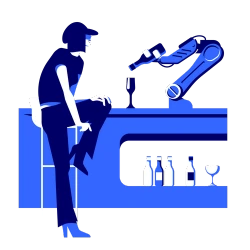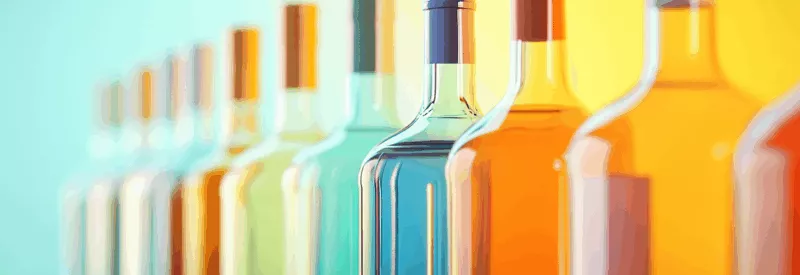Navigating Indiana’s liquor licensing terrain involves selecting the right license for your business model, from on-site to off-site permits. Understanding the regulations, local mandates, and fees outlined by the Alcohol & Tobacco Commission is key. This brief guide illuminates how to obtain an Indiana liquor license and process payments in this industry. Securing merchant services in a high-risk industry can be challenging for a business owner, but we’ll help you navigate each step of the process.
Types of Indiana Liquor Licenses

Like most other states, Indiana has several liquor license options: an on-license, off-license, beer & wine license, restaurant liquor license, server license, tavern liquor license, or an “All Liquor License.” An on-license allows businesses to sell alcohol on-site, ideal for restaurants. In contrast, an off-license allows businesses to sell alcohol off-site, ideal for a liquor store.
Specifically, Indiana has the following licenses: Brewer, Beer Retailer, Beer and Wine Retailer, Beer, Wine and Liquor Retailer, Wine vintner, Wine retailer, Malt manufacturer, and Employee permit, among others.

What type of liquor license do I need?
To determine the appropriate Indiana liquor license, consider the nature of your business. You’ll need an on-license if you want to sell liquor for on-site consumption. However, an off-license is required if you intend to sell liquor for consumption off your premises. A beer and wine license is suitable if your focus is solely on beer and wine. Suppose you want to offer a broader selection. In that case, you can choose between a restaurant liquor license, allowing the sale of various alcoholic beverages within your establishment, or a tavern liquor license, which is more tailored to businesses emphasizing beer and wine sales with limited spirits options.
Liquor License Requirements for Indiana
Various requirements apply to obtain a liquor license in Indiana, specific to the type of license sought. For instance, a tavern license requires alcohol sales to be over 50 percent of total sales, and on-licenses are not granted for off-premises alcohol service. The legal drinking age for all serving staff is 21. Local regulations, background checks, and an intricate application process are also key aspects.
Some licenses mandate responsible beverage service training. Due to potential variations in state laws, you should contact the Indiana Alcohol and Tobacco Commission or check their website for the latest information.

Other necessary permits
In addition to an Indiana liquor license, businesses in Indiana may require various permits, such as a general business license, health department permits for food service, zoning permits for compliance with local regulations, fire department permits for safety, and building permits for renovations. Entertainment, signage, occupancy, environmental, and parking permits may also be necessary, depending on the nature of the business.
Understanding Liquor Laws in Indiana
Businesses must have a comprehensive grasp of Indiana’s nuanced alcohol laws, which are under the jurisdiction of the Indiana Alcohol & Tobacco Commission (ATC).
The Indiana Alcohol & Tobacco Commission serves as the key authority for issuing and regulating liquor licenses in the state. State law allows alcohol sales from 7 a.m. to 3 a.m. daily [1]Indiana Alcohol & Tobacco Commission. “Rules & Laws”. Accessed July 19, 2024.. Still, variations exist for carryout sales, especially on Sundays for liquor stores, groceries, pharmacies, and convenience stores. Operational guidelines, encompassing aspects like hours of operation and age verification, are integral for legal and safe alcohol sales.
The historical backdrop of the Indiana liquor license involves Prohibition-era blue laws influencing the Sunday sales ban. The liquor store industry often contested this for economic reasons. Indiana permits the open carrying of alcohol in public spaces, though individual premises may have restrictions. The state prohibits happy hours to deter binge drinking, allowing all-day drink specials but disallowing reduced-cost sales during specific hours. Recent legal changes permit alcohol sales on Election Day and Christmas Day. Unique to Indiana, laws regulating cold beer sales for carryout are influenced by the liquor store industry’s preferences.
How Much Does a Liquor License Cost in Indiana?
The following list is only for a few of the alcohol licenses in Indiana. Visit the ATC website for a full list of licenses and their costs.
- Brewer – $2,000
- Beer Retailer – $500
- Beer & Wine Retailer – $750
- Beer, Wine, & Liquor Retailer – $1,000
- Wine vintner – $2,000
- Wine retailer – $500
- Malt manufacturer – $2,000
- Employee permit – $45
How to Apply for a Liquor License in Indiana
The quickest way to an Indiana liquor license is to submit an online application.

To apply for a liquor license in Indiana through MyLicenseOne, create an “Access Indiana” account and log in. Initiate the new application process by clicking on “Initial Application.” Choose the type of application, and in the dynamic sections, provide relevant information about your business, premises, and qualifications.
Disclose ownership details, including 2% or higher interests, and upload necessary attachments. Answer questions about the retailer permit, minors on-premises, and carry-out supplement sections. Upload a floor plan and additional documentation, and review the application in the affirmation section. Proceed to pay the required fees, ensuring accuracy in payment information. Complete the process by affirming payment and receiving a confirmation.
Additionally, you should be prepared to defend your proposal in case of protests. You can seek assistance from a liquor license defense attorney.
How to Renew Your Indiana Liquor License
You can get an Indiana liquor license renewal 90 days before the annual expiry date. The application process is similar to when you first apply for a liquor license. The only difference is that you have to submit a different form.

Manufacturer/Wholesaler
To renew your Indiana manufacturer/wholesaler alcoholic beverage permit, use State Form 56886. Submit the typed or printed application with payment at least 90 days before expiration. Disclose changes, attach a Property Tax Clearance – Form 1, and report annual sales and distribution figures as required. Provide ownership details and include a Disclosure of Interested Parties form if there are changes.
Complete additional sections covering operations, employee permits, manager questionnaires, and, if applicable, floor plan updates. Certify the application’s accuracy and include the required payment following the fee schedule outlined in Section 11. Mail the application and payment to the Indiana Alcohol and Tobacco Commission.

Retailer/Dealer
To renew a retailer/dealer Indiana liquor license, complete State Form 47. Provide details in sections covering general information, business ownership, annual sales/production, operations, and manager questionnaire. Include any floor plan changes and, for retail permittees, complete the Carry-Out and Six (6) Month Report. Sign the Certification of Applicant, attach payment, and submit the application at least 90 days before the permit expires.
Getting a Beer and Wine License in Indiana: Closing Thoughts
In Indiana, each beer and wine license type has unique requirements. Beyond the liquor license, businesses may need general business licenses, health department permits, and zoning permits. Understanding Indiana’s alcohol laws is crucial for compliance. After getting your liquor license, your next step will be finding reliable payment processing to allow you to accept payments for your products.
It’s best to open an alcohol merchant account with a payment service provider that has experience with restaurants and bars. PaymentCloud can offer a dedicated account manager and customizable solutions to help your business thrive. Contact us today to see how we can help!
FAQs
How long does it take to get a liquor license in Indiana?
Acquiring a liquor license in Indiana will take 10-12 weeks. The timeline depends on the license type and the completion of your application. You should initiate the process well in advance of your planned opening date.
Do you need a liquor license to sell beer or wine in Indiana?
Yes, a liquor license is required to sell beer or wine legally in Indiana. The state offers various licenses, including beer and wine licenses, restaurant liquor licenses, and others, each catering to different business needs. The specific license you need depends on factors such as whether you want to sell alcohol for on-site or off-site consumption and the range of alcoholic beverages you intend to offer.
Is it hard to get a liquor license in Indiana?
Acquiring a liquor license in Indiana involves a comprehensive application process with specific requirements, background checks, and potential public notice. Careful preparation, adherence to state laws, and seeking legal assistance can streamline the process.
How long does an Indiana liquor license last?
An Indiana liquor license is valid for one year. Renewal is required annually. To ensure continued legal operation, the renewal application must be submitted at least 90 days before expiration.
How do I get a temporary or one-day liquor license in Indiana?
To secure a one-day beer and wine permit in Indiana, follow these how much for liquor license steps:
- Application Process: Complete the Temporary Beer and Wine Permit Application, which is available on the ATC’s Form Page. Ensure all fields are accurately filled out.
- Submission Timeline: Submit the application to the local Excise office at least five days before the event. Timely submission is crucial for processing.
- Documentation: Include a floor plan on the application or attach it separately on an 8.5” x 11” paper to outline the event space.
- Fee Payment: Submit the application fee of $50 per day along with your application for the temporary permit.
- Important Considerations: The permit is for beer and wine only, not liquor. You need a licensed alcoholic beverage caterer for liquor service. The permit is valid for on-premises consumption, and carry-out sales are prohibited. Attendees cannot bring their own alcoholic beverages to the event under this permit.




